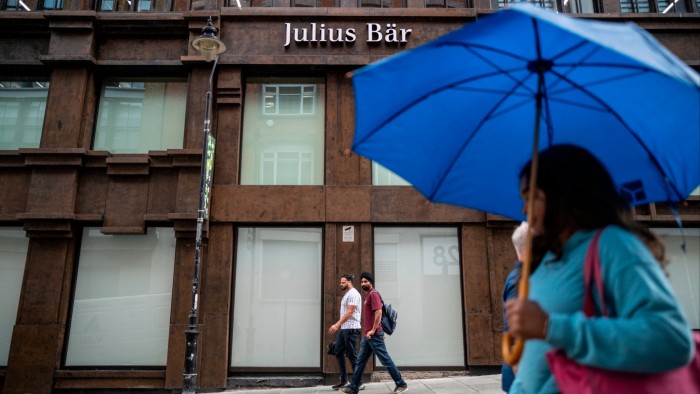Unlock the Editor’s Digest for free
Roula Khalaf, Editor of the FT, selects her favourite stories in this weekly newsletter.
Julius Baer has been ordered to pay more than SFr4mn by Switzerland’s financial regulator over anti-money laundering and compliance failings in its handling of high-risk clients.
The enforcement decision, contained in a document dated November 2024 and seen by the Financial Times, has not been publicly disclosed.
The decision focused on the failure by Julius Baer, Switzerland’s second-largest listed lender after UBS, to detect or act on suspicious transactions between 2009 and 2019, according to the Swiss Financial Market Supervisory Authority’s (Finma) decision notice seen by the FT.
The enforcement action is the latest blow to scandal-hit Julius Baer, which is attempting a turnaround. It comes after the private bank was last year forced to write down its full SFr606mn exposure to now-collapsed Austrian property group Signa, triggering a leadership overhaul.
In its November decision, the regulator found Julius Baer had committed a “serious violation” of rules, citing the bank’s obligations to combat money laundering.
It ordered the bank to repay SFr3mn in unlawfully earned profits, which would be “confiscated . . . for the benefit of the Swiss Confederation”, according to the document. The bank was also ordered to pay SFr1.3mn in costs.
According to the document, Finma’s investigation covered issues relating to a client cluster involving a Russian banker suspected by Moscow authorities of embezzlement. Another cluster, about which concerns were raised by whistleblower reports, was linked to several Indian nationals who were served primarily by the bank’s “non-resident Indian” team in Dubai, as well as from Zurich and Singapore.
Finma found that the bank had continued to manage the Russian banker’s accounts despite red flags including legal proceedings against him and questions over the source of his wealth. Julius Baer failed to identify and adequately respond to these risks, the watchdog said.
The regulator also highlighted issues at booking locations, including its Monaco and Singapore branches.
The decision is separate from enforcement proceedings disclosed by the regulator in February regarding Julius Baer’s losses related to Signa, the property empire owned by Austrian tycoon René Benko that filed for administration in 2023 amid mounting debts.
Finma has previously punished Julius Baer for falling “significantly short” of its obligations to combat money laundering and have appropriate risk management policies. In 2020 it banned the bank from carrying out large acquisitions over shortcomings in connection with cases of alleged corruption between 2009 and 2018, linked to state-owned energy group Petróleos de Venezuela (PDVSA) and football’s international governing body Fifa.
The bank has overhauled its leadership, with former Goldman Sachs banker Stefan Bollinger joining as chief executive in January and launching an aggressive cost-cutting programme, axing jobs, slimming down the executive board and refining the bank’s strategy. Former HSBC boss Noel Quinn took over as chair this month.
The latest enforcement decision is likely to add pressure to reform Julius Baer’s risk management processes. The bank previously said it had begun overhauling its systems and remained committed to meeting compliance standards.
Following pressure from shareholders and regulators, it said last year that it would shut its private debt business, which had become increasingly exposed to Signa.
Julius Baer declined to comment.
Finma said it “does not comment on its supervisory activities or individual cases or on any possible investigations or proceedings”.
https://www.ft.com/content/89c50c44-d11b-4b32-bf2e-db3455a4874d


